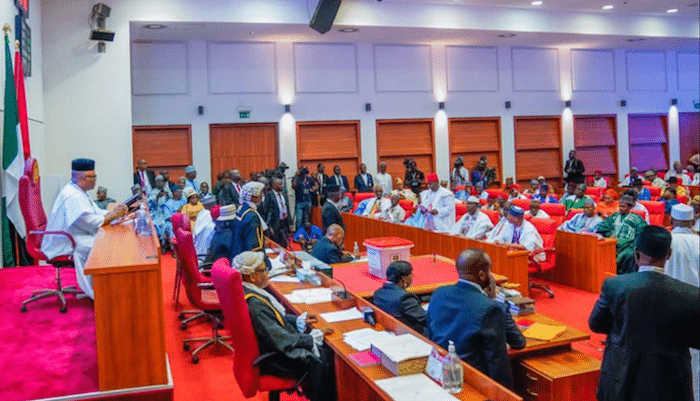Some agricultural experts, on Thursday, met in Nigeria’s capital city, Abuja, to discuss and showcase innovative ways to address lingering food and nutrition insecurity across Nigeria and Africa.
The experts spoke at the Sahel Food Systems Changemakers Conference (SFSC), themed: “Innovative Governance Models: a Pathway to Food and Nutrition Security in Nigeria.”
The event was organised by the Sahel Consulting Agriculture and Nutrition Limited in partnership with the Centre for Journalism Innovation and Development (CJID) and the Federal Ministry of Agriculture and Food Security (FMAFS) among other partners.
Temitope Adegoroye, the managing partner at Sahel Consulting Agriculture and Nutrition, said the organisation’s aim this year is to amplify innovative governance models that can offer fresh perspectives and practical solutions to the challenges facing Nigeria’s food systems.
 Mr Adegoroye while delivering his remarks @ SFSC 2024 (Photo Credit: Samuel Ojo/ CJID)
Mr Adegoroye while delivering his remarks @ SFSC 2024 (Photo Credit: Samuel Ojo/ CJID)“We recognise that inefficient governance structures, inadequate policies, and limited collaboration have hindered progress in our food systems. Achieving food security in Nigeria requires governance innovations that foster efficient, evidence-based decision-making,” the food system expert noted.
He explained that Sahel Consulting is ready to collaborate with key organisations to turn the ideas and strategies discussed at the conference into reality and to promote innovative governance models that will drive sustainable growth in the agricultural sector.
“We believe that development actors and the private sector are pivotal to driving growth within this sector, and we provide them with the tools and support needed for success,” he said.
Nigerians need credible journalism. Help us report it.
Support journalism driven by facts, created by Nigerians for Nigerians. Our thorough, researched reporting relies on the support of readers like you.
Help us maintain free and accessible news for all with a small donation.
Every contribution guarantees that we can keep delivering important stories —no paywalls, just quality journalism.
Concerns
Mr Adegoroye explained that the conference came at a time of immense significance amidst the biting impacts of climate change, skyward food inflation and straining income among others, which are negatively affecting the state of food security in the country.
“Climate change is no longer a distant concern – it is an immediate reality impacting all aspects of our lives, especially our diets and food systems,” he noted.
He said despite Nigeria’s rich culinary heritage, food insecurity persists.
Rising food costs
Food prices in Nigeria have been rising sharply in recent years. The situation worsened in 2023 when President Bola Tinubu removed petrol subsidies and allowed the naira to float. The government later declared a state of emergency on food insecurity amid perceived shortages and high inflation.
According to Nigeria’s Bureau of Statistics (NBS), Nigeria’s food inflation rate in September 2024 was 37.77 per cent. It said on a year-on-year basis, it was 7.13 percentage points higher than the rate recorded in September 2023 (30.64 per cent).
This shift has led to a steep increase in the cost of staple foods pushing many Nigerians further into poverty and heightening food insecurity.
The persistent surge in prices over the past year has led to the closure of several farms and businesses, with many agricultural producers scaling back their output due to insecurity and unpredictable weather conditions affecting rural areas.
In October last year, the Nigerian government and its partners projected that about 26.5 million Nigerians would face high levels of food insecurity in 2024. This projection, a rise from the 18.6 million Nigerians experiencing food insecurity as of October last year, was expected to peak at the “height of the 2024 lean season.”
Aside from tough government policies causing high prices of staple foods, perennial flooding disasters have further worsened food availability, affordability, and accessibility, leaving millions in dire humanitarian need.
Aside from the perennial floods, other drivers of declining food security in Africa’s most populous country include massive post-harvest losses, effects of climate change, and land degradation, which have reduced the fertility and productivity of farmlands.
The World Bank’s food security report for September 2024 ranked Nigeria as the fifth country hardest hit by food inflation in the world and the third in Africa, trailing Malawi and Liberia.
This assessment is reflected on the global hunger ranking chart, with Nigeria emerging 110th out of the 127 countries in the 2024 Global Hunger Index (GHI). With 28.8 points on the Index, Nigeria is among countries with “serious” hunger levels.
These data, Mr Adegoroye said, underscore the importance of Sahel’s continued efforts in convening the Food Systems Changemakers Conference, which has catalysed multisectoral collaboration in addressing the gaps within Nigeria’s food system.
Leveraging existing opportunities
In an interview with PREMIUM TIMES on the sidelines of the event, Tony Bello, chairperson of Shine Bridge Global Inc. and Cassava Industrialisation lead, said there’s so much that we can do with cassava, a major crop produced across Nigeria.
“Let us fortify the flours, and create new functional industrial ingredients. Let’s leverage the existing infrastructure that we have in place,” the food system expert said.
 Mr Bello
Mr BelloHe said there are many successful private-sector individuals in this country, hence, collaboration and partnership are key to unlocking the existing opportunities across agricultural value chains in the country.
He urged the government to create an institutional mechanism to observe and report the private sector’s progress and remove multiple taxes.
“Let us do the practical things. Let’s review what we have done before. Every administration should not come up with something new, but let’s carry forward those things we consider as best practices. This is the way to succeed. It is not rocket science,” Mr Bello noted.
He encouraged the government to include private sector individuals in government, emphasising that they should be people who are not hungry, starving and are not looking for money to enrich themselves.
For her part, Aisha Hadejia, a partner at Sahel Consulting, said that to advance food and nutrition security in Nigeria, we need to showcase “what we have in Nigeria.”
“Everything edible here (at the conference exhibition booth) is made in Nigeria,” Ms Hadejia said. “Unless we can put forward our indigenous food, which is nutritious and readily available, we’ll not get anywhere.”
 Aisha Hadejia, a Partner at Sahel Consulting
Aisha Hadejia, a Partner at Sahel ConsultingShe said local producers need to work together and that they need to find the right network and connect with the right people (Customers, investors and collaborators).
She said local producers need to be equipped with information and financial resources, which are key to unlocking business opportunities for small-scale producers.
Planting the right seeds, partnerships and collaboration
In his intervention, Stephen Oludapo, the acting executive secretary of the Seed Entrepreneurs Association of Nigeria (SEEDAN), encouraged farmers to plant quality seeds to get the right results.
 Mr Oludapo, SEEDAN Acting Executive Secretary
Mr Oludapo, SEEDAN Acting Executive Secretary“The cost of seeds in any agricultural production is often less than five-10 per cent. No matter how good other agro inputs used by farmers are, if you don’t use good seeds, it is the same as wasting resources because the seeds carry the genetic potential for any meaningful agricultural production to be optimal,” he said.
Meanwhile, Fisayo Kayode, a senior manager at Sahel Consulting Agriculture and Nutrition Limited, believes one strategy to foster innovation among Nigerian food producers involves fostering collaboration and knowledge sharing at cooperative levels.
She said creating agricultural cooperatives empowers farmers with collective bargaining power, access to shared resources, and economies of scale.
“Our government also needs to partner with private companies to invest in agricultural extension services that provide tailored training and support to farmers on climate-smart agriculture, sustainable land management, and efficient post-harvest handling,” she added.
Support PREMIUM TIMES' journalism of integrity and credibility
At Premium Times, we firmly believe in the importance of high-quality journalism. Recognizing that not everyone can afford costly news subscriptions, we are dedicated to delivering meticulously researched, fact-checked news that remains freely accessible to all.
Whether you turn to Premium Times for daily updates, in-depth investigations into pressing national issues, or entertaining trending stories, we value your readership.
It’s essential to acknowledge that news production incurs expenses, and we take pride in never placing our stories behind a prohibitive paywall.
Would you consider supporting us with a modest contribution on a monthly basis to help maintain our commitment to free, accessible news?
TEXT AD: Call Willie - +2348098788999

















 English (US) ·
English (US) ·